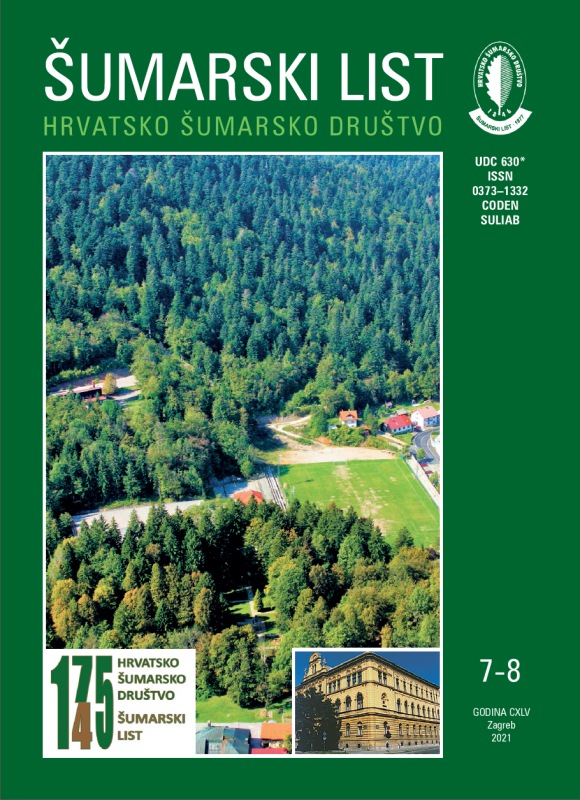
broj: 7-8/2021
pdf (11,7 MB) |
|
||||||||||||||
| RIJEČ UREDNIŠTVA | ||
| Uredništvo | ||
| Who is to blame for poor business results of wood processors? pdf HR EN | 309 | |
| IZVORNI ZNANSTVENI ČLANCI | ||
| Damir Ugarković, Ivan Seletković, Ivica Tikvić, Mladen Ognjenović, Krešimir Popić, Marko Orešković, Nenad Potočić | UDK 630* 111.8 + 228 (001) https://doi.org/10.31298/sl.145.7-8.1 | |
| Relationship of silver fir (Abies alba Mill.) mortality in the area of Fužine with climatic and structural parameters pdf HR EN | 311 | |
| Marina Popijač | UDK 630*180 + 181.4 (001) https://doi.org/10.31298/sl.145.7-8.2 | |
| Distribution of 137Cs and 40K in the tissue of silver fir trees (Abies alba Mill.) from Lika (Croatia) pdf HR EN | 323 | |
| Ivan Tekić, Charles Watkins | UDK 630* 902 (001) https://doi.org/10.31298/sl.145.7-8.3 | |
| Sacred groves - an insight into Dalmatian forest history pdf HR EN | 337 | |
| Arzu Ergül Bozkurt, Kamil Coşkunçelebi, Salih Terziog˘lu | UDK 630* 164 (001) https://doi.org/10.31298/sl.145.7-8.4 | |
| Population variability of scots pine (Pinus sylvestris L.) in Turkey according to the needle morphology pdf HR EN | 347 | |
| Askin Gokturk, Ethem Kara, Murat Sabri Sadiklar | UDK 630* 232.3 + 111 (001) https://doi.org.10.31298/sl.145.7-8.5 | |
| The effects of storage temperatures and pretreatments on the germination of azarole (Crataegus azarolus var. pontica) seeds pdf HR EN | 355 | |
| PRETHODNO PRIOPĆENJE | ||
| Osman Mujezinović, Mirza Dautbašić | UDK 630* 453 https://doi.org/10.31298/sl.145.7-8.6 | |
| First record of Cacopsylla pulchella (Hemiptera: Psyllidae) in Bosnia and Herzegovina pdf HR EN | 363 | |
| Atinç Pirti, Ramazan Gürsel Hoşbaş | UDK 630* 641 https://doi.org/10.31298/sl.145.7-8.7 | |
| Evaluation of the performance between post process kinematic and static technique in the forest environment pdf HR EN | 367 | |
| PREGLEDNI ČLANCI | ||
| Matija Landekić, Ana Gajšek, Gabrijela Seletković, Mario Šporčić | UDK 630* 907 https://doi.org/10.31298/sl.145.7-8.8 | |
| The role of ecological certification in the context of sustainable forest management in the Republic of Croatia pdf HR EN | 379 | |
| Summary The unsustainability and disproportion between available resources and demands of market economy, as well as the persistent degradation of the environment, resulted in the emergence of a politically supported global concept of »sustainable« development. In the business world widely accepted form of behaviour which business organizations have accepted and implemented in response to the need for sustainable development is »corporate social responsibility«. Definition of corporate social responsibility and its connection, through the social and environmental aspect, with the most important management standards such as SA8000, ISO 14000, FSC, eco-labels, etc. is shown in the introduction part of this paper. In addition, the introduction provides a brief overview and the role of the two umbrella organizations, the International Social and Environmental Accreditation Alliance (ISEAL) and the Global Ecologging Network (GEN). Key information about ecological certification of products and ten national eco-labels from Europe and the World are also shown. Companies in the forestry sector implement the environmental aspect of corporate social responsibility in practice through (a) forest certification as a mechanism for improving forest management and (b) through the certification of ecological products. Accordingly, the legislative framework and the system of ecological certification and control within the European Union with the case study of the Republic of Croatia are presented in the central part of the paper. The process of environmental certification of products by the control body is presented and explained through five key steps: (a) introductory interview with the entity, (b) tour of the production unit, (c) control of documentation, (d) report writing and (e) final comment of the expert control. The certification of non-wood forest products as a neglected niche of the forestry sector of the Republic of Croatia is additionally emphasized, where special accent is placed on the need for transition from log-oriented traditional management to multifunctional sustainable management under the motto »from log to berry«. In addition, the paper presents examples of good practice in the management and certification of non-wood forest products through FSC standards and environmental certification of products. An overview of certification models of non-wood forest products by scope is also shown in the paper. As part of the discussion and conclusions, the key reasons / limitations for the low interest in ecological certification, but also in the collection and processing, of non-wood forest products in the Republic of Croatia are stated. In conclusion, the paper states the need for (a) development of methodology and tools for production possibilities quantification of non-wood forest products, (b) formation of non-wood forest products database, (c) development of national ordinances that will regulate and control the collection and processing of non-wood forest products, and (d) encouragement of non-wood forest products certification process (through the FSC model, environmental certification, etc.) with the aim of achieving added value in the promotion and sale of products in the domestic and foreign markets. Key words: forestry; environmental protection; certification; eco-labels; FSC | ||


